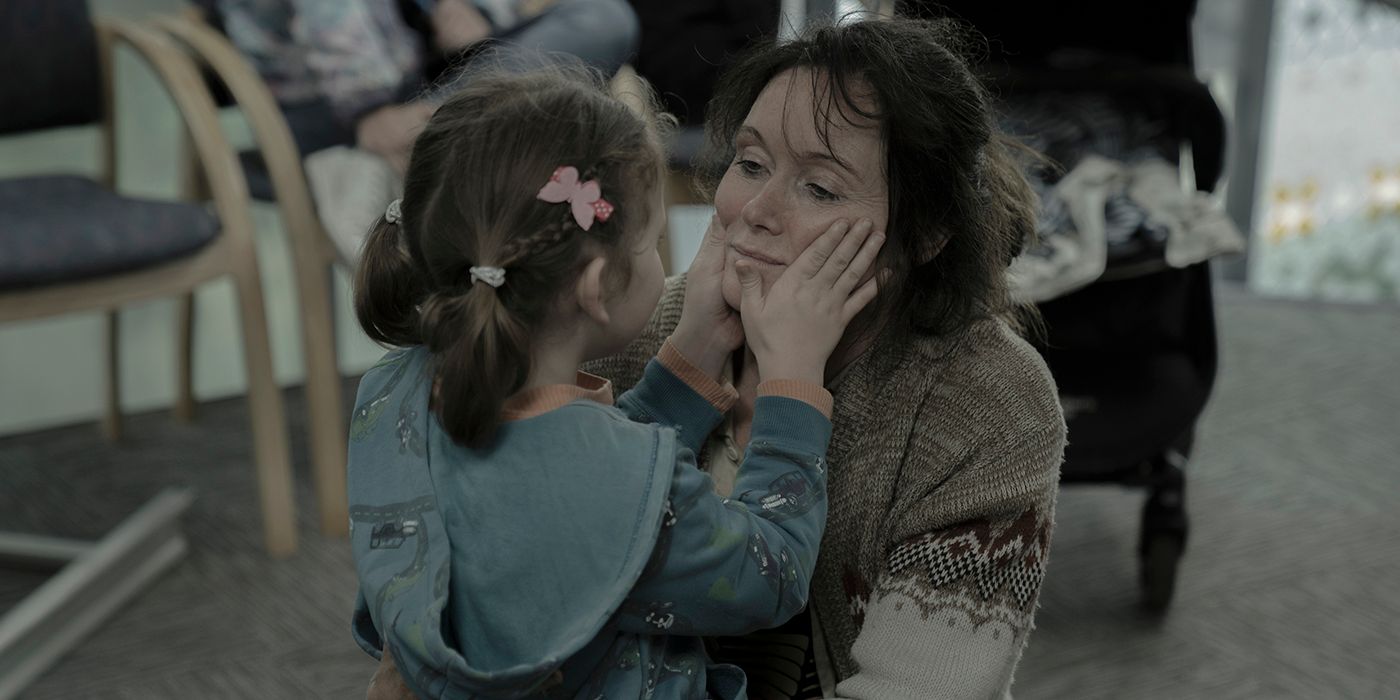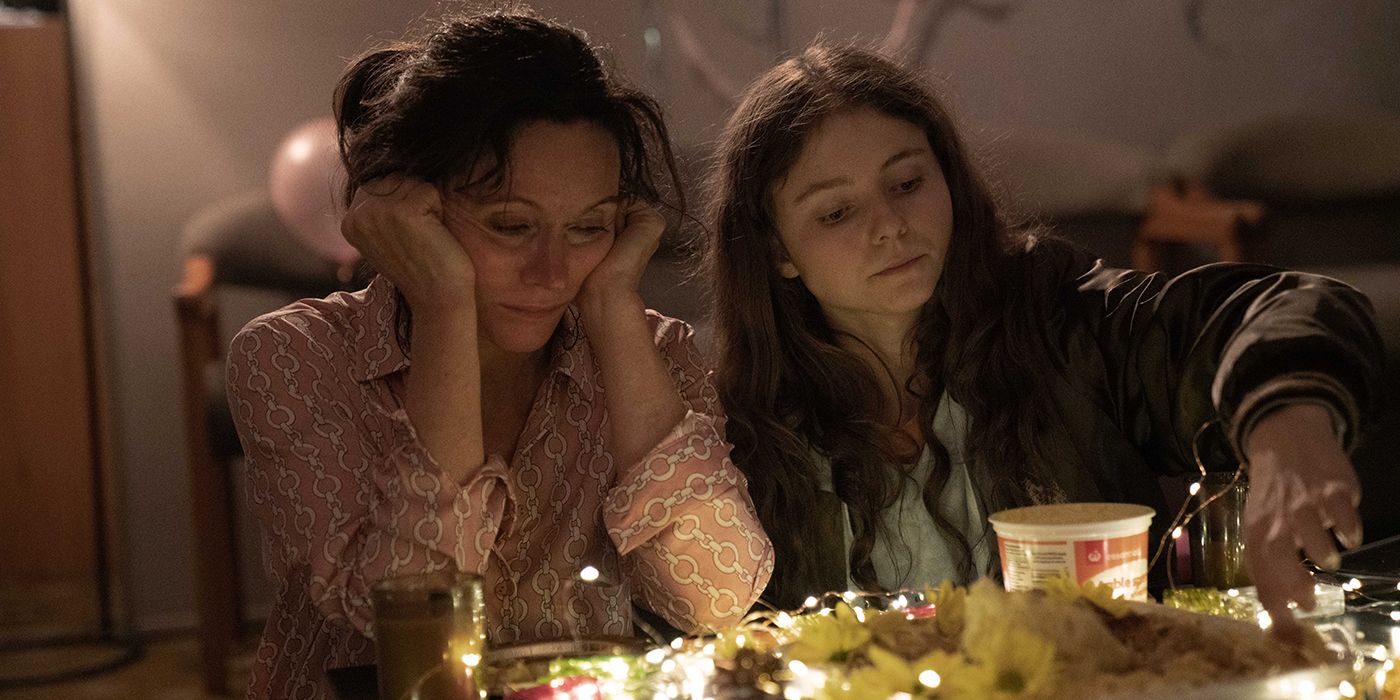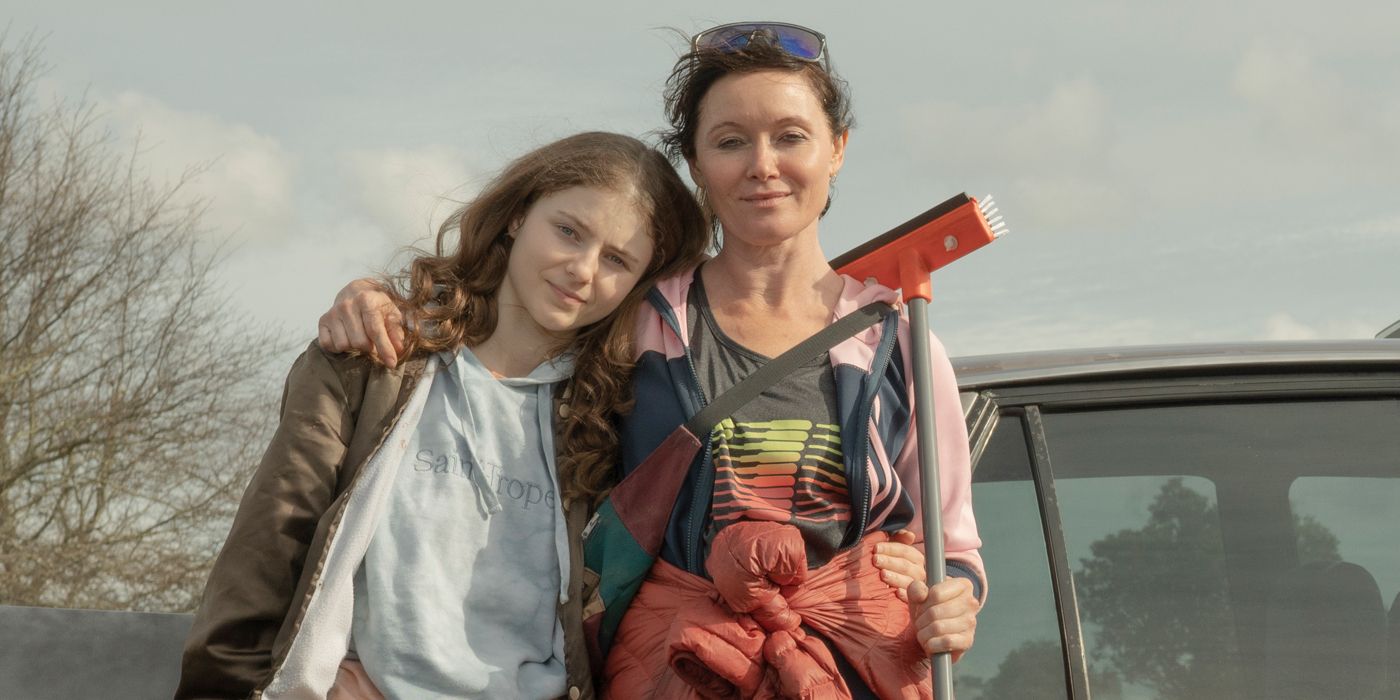Essie Davis is a single mother trying to win back her children in The Justice of Bunny King. The film centers on its titular protagonist, a woman who makes her living by washing windows along an interlocked highway, and who is working to earn back custody of her children from the government in time for her daughter's birthday.
Alongside Davis, the cast for The Justice of Bunny King includes Thomasin McKenzie, Amelie Baynes, and Angus Stevens. The indie drama hails from Gaysorn Thavat, who is directing on a script from Sophie Henderson.
In anticipation of the film's release, Screen Rant spoke exclusively with star Essie Davis to discuss The Justice of Bunny King, the film's emotional story, helping resurrect much of the original script, reuniting with Thomasin McKenzie, and more.
Essie Davis On The Justice of Bunny King
Screen Rant: I watched the film this morning and I loved it, it was such a moving film from start to finish. What about The Justice of Bunny King really caught your interest to want to be a part of it?
Essie Davis: Thank you very much. I think when I first read it, I just loved the slow intrigue of finding out more and more about Bunny as she found out [a dark thing in her family] and that she was looking for a home for her children, and then you meet what you think are her children and turns out to be they're her sister's children. I love that kind of unraveling of finding out her situation.
But I also just love her resilience and buoyancy and joy and hopefulness and upbeat kind of problem-solving way of being. I loved all of the naughty things that she does, to pay back her, her brother-in-law, her sister's coercive, controlling boyfriend. And I love all the vandalism and destruction that she causes. [Laughs] I think he thoroughly deserves [it]. I loved it because it opened my eyes to a world I didn't really know that much about, and I think it's the voice of hundreds of thousands of women who hide in the shadows that don't have a voice and, as Bunny has to do, have to jump through hoop after hoop after hoop to prove their worth or their value.
I think it's really timely, because of the homeless crisis and the poverty line, and women standing up for themselves in bad, toxic relationships, I think it's a really important film.
I couldn't agree more with all of that. What were some of the biggest creative challenges for you in getting to the heart of Bunny?
Essie Davis: Well, there was a lot of homework to do. I had a lot of homework to do on the accent, because it's a really tricky accent, even though I'm Australian, it's close, but it's far. The script was absolutely, gobsmackingly beautiful. It had an end that really needed resolving, but a year later, when it finally was financed, it had been transformed into something that was not what I originally signed on to do. It had its heart and soul totally ironed out of it, so Gaysorn and I literally went through the rubbish bin and pull the script back out of it and went, "This is the baby, this is what we got!" So, we spent a lot of time resurrecting the script from a lot of script development process that had kind of killed it. I hope that the writer is as proud of it as she should be, because that was her gold to start with, and it was a big creative process. There was a lot of research to do, a lot of women to meet with, and I watched a lot of documentaries.
Then finding who Bunny is, physically, from the outside as well as the inside was another collaborative process with the makeup team and the Wardrobe costume designer, just trying to find that kind of poverty but with joy. Someone who ends up on the street, but still wanting to present herself as this kind of sexy woman. [Laughs] What I really found amazing was the process of finding the outfit for dressing for success, this dress to impress thing. I went along to the Dress for Success people in New Zealand, who were helping women find outfits for job interviews and to sort their lives out when they had so little money. It was amazing, it's an amazing charity where people donate cool outfits and looks to put together for women, and I loved Bunny's thing of, "No, I just want pants, I don't want a dress," and then being put in that blue suit.
When you see how people are transformed by looking at their own image in a way that they've never seen themselves, it's profound. To be able to have Bunny put on that blue suit and be transformed into this person who could do anything. Because when people looked at her, they trusted her and believed in her and thought she was wealthy and had it together, and it was this magic suit. I loved the whole process of having the suit designed for me, but made in a way that looked like it had been worn by seven other people before and was a hand-me-down in a charity store. It was so lovely to put on that suit and feel like, "Yeah, this is my John Travolta suit, I'm going out, I'm going out dancing." [Laughs] You know, "I'm gonna be a different person, I'm going to succeed in this world." That was a wonderful creative experience, and making sure that the script just didn't go into this dark place all the time.
It's a dark story, but what I loved most about it was the positive, buoyant approach and Bunny's constant sense of humor. No matter how many mistakes she makes, or how extreme her reactions are, sometimes she's got a levity to her and a hope and a buoyancy that's all play and joy to share with her gorgeous kids. That was really important to me that it retained that levity in the script, that you're not just sitting there going, "Oh, no." You just can sit there and laugh at the audacity of the situation, or cry because it's so f----d up. [Laughs] But her joy means that you're on her side, you're rooting for Bunny, you're going, "Come on Bunny, you can do it. You can do it."
I definitely felt that was an important thing to making this film work. I'm curious, was there any specific part of the script that you brought back that you were proudest to have reinstated?
Essie Davis: The whole thing. [Laughs] I’m very proud, it was a big rescue project.
The last time we talked, it was for the True History of the Kelly Gang,. But if memory serves me right, you didn't actually share any screen time together with Thomasin McKenzie on that one. Because it was Justin Kurzel directing, did you get to spend a little time with her on that set before working on this one?
Essie Davis: Yeah, we did actually spend screen time together. But my character, Ellen is very possessive of Ned, who was going out with her character. We did share screen time, but it was very aggressive, she comes to prison to plead with Ellen, with her baby, to tell her son to go to America to get out, stop trying to rescue her from prison. And Ellen says, “You'll know when your son grows up, whether you've been a good mom or not, if he wants to rescue you.”
It was quite an evil kind of relationship, because Ellen was so determined that her son stay close to her, and she does say, Go, be gone. You love her. Go on, go on.” He can't be with her, but when it comes down to it, she's like, “Yeah, but he really wants to look after me more, so screw you.” Then, getting to play with her and love her and blow up balloons with her and take her on crazy adventure was a lovely antidote to our brief, antagonistic relationship. But yeah, we get on very well. [Chuckles] Neither of them was a problem, but it was nice to have a lovely relationship on camera with her as well.
About The Justice of Bunny King
Bunny King (Essie Davis, THE BABADOOK), a headstrong mother of two with a sketchy past, earns her keep by washing windows at traffic lights. Using her razor-sharp wit to charm money from gridlocked motorists, she saves every cent to get back the custody of her kids. After promising her daughter a birthday party, Bunny must fight the social services and break the rules to keep her word, but in doing so risks losing her children altogether.
Accompanied by her niece Tonya (Thomasin McKenzie, Film Independent Spirit Award nominee, LEAVE NO TRACE, LAST NIGHT IN SOHO), a fierce teenager running away from home, Bunny is in a race against the clock and headed towards an epic showdown with the authorities.
The Justice of Bunny King is now in select theaters.




